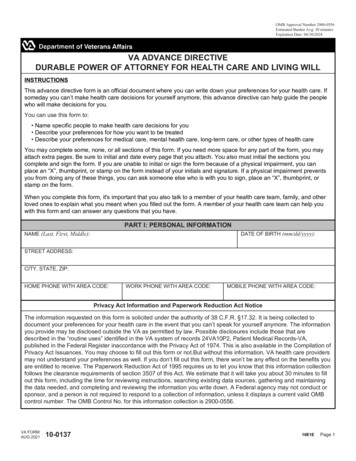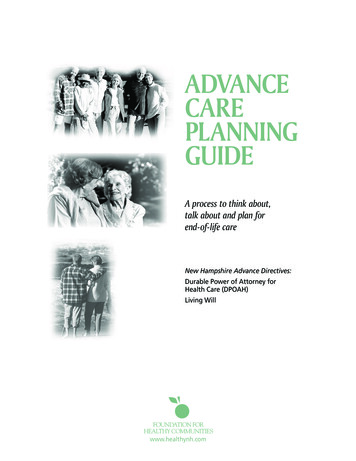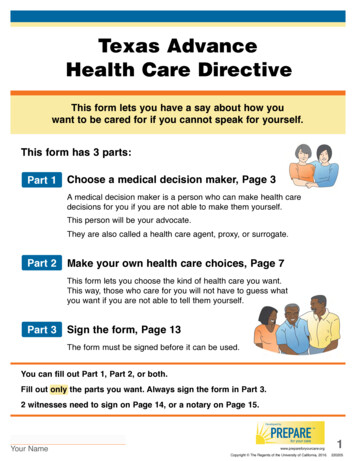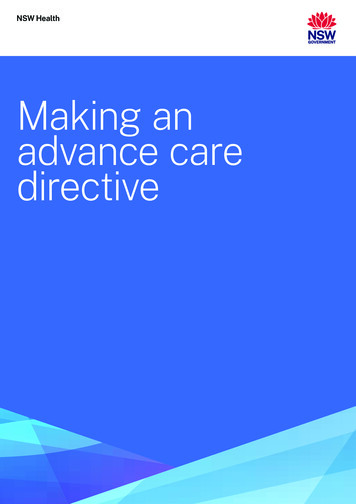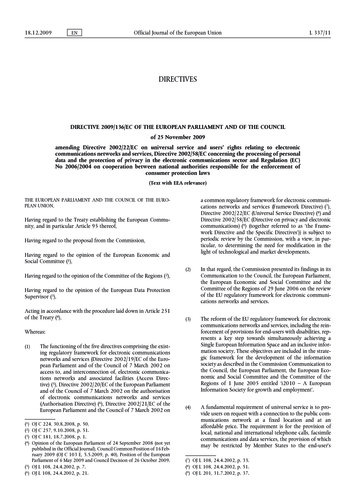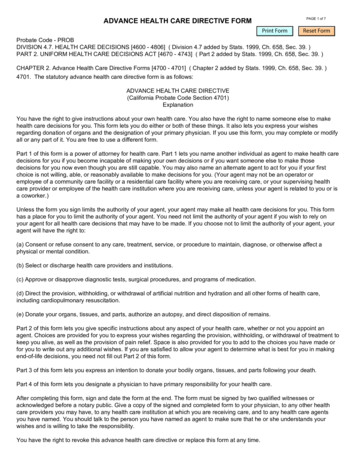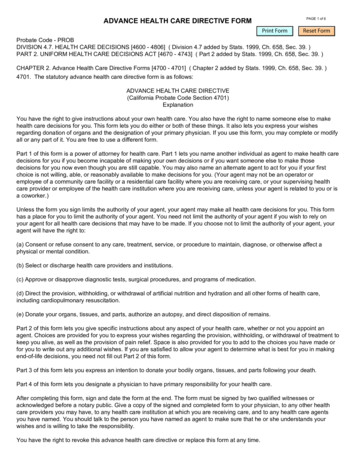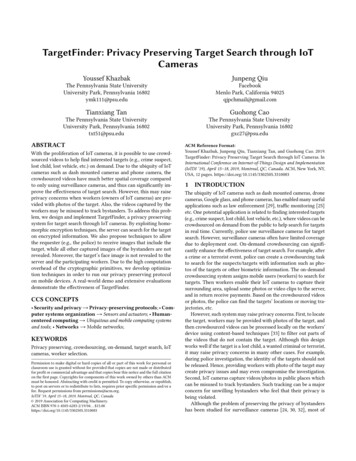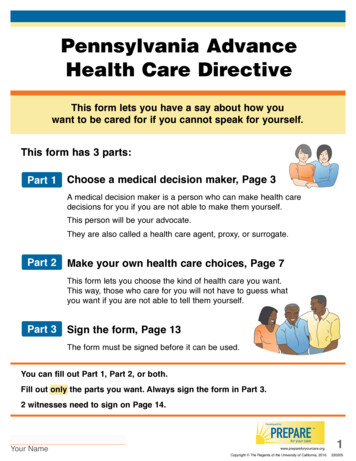
Transcription
Pennsylvania AdvanceHealth Care DirectiveThis form lets you have a say about how youwant to be cared for if you cannot speak for yourself.This form has 3 parts:Part 1 Choose a medical decision maker, Page 3A medical decision maker is a person who can make health caredecisions for you if you are not able to make them yourself.This person will be your advocate.They are also called a health care agent, proxy, or surrogate.Part 2 Make your own health care choices, Page 7This form lets you choose the kind of health care you want.This way, those who care for you will not have to guess whatyou want if you are not able to tell them yourself.Part 3 Sign the form, Page 13The form must be signed before it can be used.You can fill out Part 1, Part 2, or both.Fill out only the parts you want. Always sign the form in Part 3.2 witnesses need to sign on Page 14.Developed byTMYour Namefor your carewww.prepareforyourcare.orgCopyright The Regents of the University of California, 2016.1220205
Pennsylvania Advance Health Care DirectiveThis is a legal form that lets you have a voice in your health care.It will let your family, friends, and medical providers know how youwant to be cared for if you cannot speak for yourself.What should I do with this form? Please share this form with your family, friends, and medical providers. Please make sure copies of this form are placed in your medical record at all theplaces you get care.What if I have questions about the form? It is OK to skip any part of this form if you have questions or do not want toanswer. Ask your doctors, nurses, social workers, family, or friends to help. Lawyers can help too. This form does not give legal advice.What if I want to make health care choices that are not on this form? On Page 12, you can write down anything else that is important to you.When should I fill out this form again? If you change your mind about your health care choices If your health changes If your medical decision maker changesIf your spouse is your decision maker, and you divorce, that person will no longerbe your decision maker.Give the new form to your medical decision maker and medical providers.Destroy old forms.Share this form and your choices with your family, friends, and medicalproviders.Copyright The Regents of the University of California, 2016.2220205
Part 1: Choose your medical decision makerPart 1Pennsylvania Advance Health Care DirectiveChoose your medical decision makerYour medical decision maker can make health care decisions foryou if you are not able to make them yourself.A good medical decision maker is a family member or friend who: is 18 years of age or older can talk to you about your wishes can be there for you when you need them you trust to follow your wishes and do what is best for you you trust to know your medical information is not afraid to ask doctors questions and speak up about your wishesLegally, your decision maker cannot be your doctor or someone who works at yourhospital or clinic, unless they are a family member.What will happen if I do not choose a medical decision maker?If you are not able to make your own decisions, a person will be chosen for youaccording to Pennsylvania law. This person may not know what you want.If you are not able, your medical decision maker can choosethese things for you: doctors, nurses, social workers, caregivers hospitals, clinics, nursing homes medications, tests, or treatments who can look at your medical information what happens to your body and organs after you dieCopyright The Regents of the University of California, 2016.3220205
Part 1: Choose your medical decision makerPennsylvania Advance Health Care DirectiveHere are more decisions your medical decision maker can make:Start or stop life support or medical treatments, such as:CPR or cardiopulmonary resuscitationcardio heart pulmonary lungs resuscitation try to bring backThis may involve: pressing hard on your chest to try to keep your blood pumping electrical shocks to try to jump start your heart medicines in your veinsBreathing machine or ventilatorThe machine pumps air into your lungs and tries to breathe for you.You are not able to talk when you are on the machine.DialysisA machine that tries to clean your blood if your kidneys stop working.Feeding TubeA tube used to try to feed you if you cannot swallow. The tube canbe placed through your nose down into your throat and stomach.It can also be placed by surgery into your stomach.Blood and water transfusions (IV)To put blood and water into your body.SurgeryMedicinesEnd of life decisions your medical decision maker can make: call in a religious or spiritual leader decide about autopsy or organ donation decide if you die at home or in the hospital decide about burial or cremationYour NameCopyright The Regents of the University of California, 2016.4220205
Part 1: Choose your medical decision makerPennsylvania Advance Health Care DirectiveBy signing this form, you allow your medical decision maker to: agree to, refuse, or withdraw any life support or medical treatment if you are notable to speak for yourself decide what happens to your body after you die, such as funeral plans and organdonationIf there are decisions you do not want them to make, write them here:When can my medical decision maker make decisions for me?ONLY after I am not able to make my own decisionsNOW, right after I sign this formIf you want, you can write why you feel this way.Write the name of your medical decision maker.#1: I want this person to make my medical decisions if I am not able to make my own:first namephone #1last namephone #2addressrelationshipcitystatezip code#2: If the first person cannot do it, then I want this person to make my medical decisions:first namephone #1addressYour Namelast namephone #2relationshipcitystatezip codeCopyright The Regents of the University of California, 2016.5220205
Part 1: Choose your medical decision makerPennsylvania Advance Health Care DirectiveWhy did you choose your medical decision maker?If you want, you can write why you chose your #1 and #2 decision makers.Write down anyone you would NOT want to help make medical decisions for you.How strictly do you want your medical decision maker to followyour wishes if you are not able to speak for yourself?Flexibility allows your decision maker to change your prior decisions if doctors thinksomething else is better for you at that time.Prior decisions may be wishes you wrote down or talked about with your medicaldecision maker. You can write your wishes in Part 2 of this form.Check the one choice you most agree with.Total Flexibility: It is OK for my decision maker to change any of my medicaldecisions if my doctors think it is best for me at that time. Some Flexibility: It is OK for my decision maker to change some of mydecisions if the doctors think it is best. But, these wishes I NEVER wantchanged:No Flexibility: I want my decision maker to follow my medical wishes exactly.It is NOT OK to change my decisions, even if the doctors recommend it.If you want, you can write why you feel this way.To make your own health care choices, go to Part 2 on Page 7. If you aredone, you must sign this form on Page 13.Please share your wishes with your family, friends, and medical providers.Your NameCopyright The Regents of the University of California, 2016.6220205
Part 2: Make your own health care choicesPart 2Pennsylvania Advance Health Care DirectiveMake your own health care choicesFill out only the questions you want.How do you prefer to make medical decisions?Some people prefer to make their own medical decisions. Some people prefer inputfrom others (family, friends, and medical providers) before they make a decision. And,some people prefer other people make decisions for them.Please note: Medical providers cannot make decisions for you. They can only giveinformation to help with decision making.How do you prefer to make medical decisions?I prefer to make medical decisions on my own without input from others.I prefer to make medical decisions only after input from others.I prefer to have other people make medical decisions for me.If you want, you can write why you feel this way, and who you want input from.What matters most in life? Quality of life differs for each person.What is most important in your life? Check as many as you want.Your family or friendsYour petsHobbies, such as gardening, hiking, and cookingYour hobbiesWorking or volunteeringCaring for yourself and being independentNot being a burden on your familyReligion or spirituality: Your religionSomething elseWhat brings your life joy? What are you most looking forward to in life?Your NameCopyright The Regents of the University of California, 2016.7220205
Part 2: Make your own health care choicesPennsylvania Advance Health Care DirectiveWhat matters most for your medical care? This differs for each person.For some people, the main goal is to be kept alive as long as possible even if: They have to be kept alive on machines and are suffering They are too sick to talk to their family and friendsFor other people, the main goal is to focus on quality of life and being comfortable. These people would prefer a natural death, and not be kept alive on machinesOther people are somewhere in between. What is important to you?Your goals may differ today in your current health than at the end of life.TODAY, IN YOUR CURRENT HEALTHCheck one choice along this line to show how you feel today, in yourcurrent health.My main goal is to liveas long as possible, nomatter what.EquallyimportantMy main goal is to focuson quality of life andbeing comfortable.If you want, you can write why you feel this way.AT THE END OF LIFECheck one choice along this line to show how you would feel if youwere so sick that you may die soon.My main goal is to liveas long as possible, nomatter what.EquallyimportantMy main goal is to focuson quality of life andbeing comfortable.If you want, you can write why you feel this way.Your NameCopyright The Regents of the University of California, 2016.8220205
Part 2: Make your own health care choicesPennsylvania Advance Health Care DirectiveQuality of life differs for each person at the end of life.What would be most important to you?AT THE END OF LIFESome people are willing to live through a lot for a chance of living longer.Other people know that certain things would be very hard on their quality of life. Those things may make them want to focus on comfort rather than trying to liveas long as possible.At the end of life, which of these things would be very hard on your quality of life?Check as many as you want.Being in a coma and not able to wake up or talk to my family and friendsNot being able to live without being hooked up to machinesNot being able to think for myself, such as severe dementiaNot being able to feed, bathe, or take care of myselfNot being able to live on my own, such as in a nursing homeHaving constant, severe pain or discomfortSomething elseOR, I am willing to live through all of these things for a chance of living longer.If you want, you can write why you feel this way.What experiences have you had with serious illness or with someone close to youwho was very sick or dying? If you want, you can write down what went well or did not go well, and why.If you were dying, where would you want to be?at homein the hospitaleitherI am not sureWhat else would be important, such as food, music, pets, or people you want around you?Your NameCopyright The Regents of the University of California, 2016.9220205
Part 2: Make your own health care choicesPennsylvania Advance Health Care DirectiveHow do you balance quality of life with medical care?Sometimes illness and the treatments used to try to help people live longer cancause pain, side effects, and the inability to care for yourself.Please read this whole page before making a choice.AT THE END OF LIFE, some people are willing to live through a lot for achance of living longer. Other people know that certain things would be veryhard on their quality of life.Life support treatment can be CPR, a breathing machine,feeding tubes, dialysis, or transfusions.Check the one choice you most agree with.If you were so sick that you may die soon, what would you prefer?Try all life support treatments that my doctors think might help. I want tostay on life support treatments even if there is little hope of getting better orliving a life I value.Do a trial of life support treatments that my doctors think might help. But,I DO NOT want to stay on life support treatments if the treatments do notwork and there is little hope of getting better or living a life I value.I do not want life support treatments, and I want to focus on beingcomfortable. I prefer to have a natural death.*If you are pregnant and become unable to make decisions: Pennsylvania law mayrequire your doctor to give you life support treatments even if you have an advancedirective.What else should your medical providers and decision maker know about thischoice? Or, why did you choose this option?Your NameCopyright The Regents of the University of California, 2016.10220205
Part 2: Make your own health care choicesPennsylvania Advance Health Care DirectiveYour decision maker may be asked about organ donation andautopsy after you die. Please tell us your wishes.ORGAN DONATIONSome people decide to donate their organs or body parts.What do you prefer?I want to donate my organs or body parts.Which organ or body part do you want to donate?Any organ or body partOnlyI do not want to donate my organs or body parts.What else should your medical providers and medical decision maker know aboutdonating your organs or body parts?AUTOPSYAn autopsy can be done after death to find out why someone died.It is done by surgery. It can take a few days.I want an autopsy. I do not want an autopsy.I only want an autopsy if there are questionsabout my death.FUNERAL OR BURIAL WISHESWhat should your medical providers and decision maker know about how youwant your body to be treated after you die, and your funeral or burial wishes? Do you have religious or spiritual wishes? Do you have funeral or burial wishes?Your NameCopyright The Regents of the University of California, 2016.11220205
Part 2: Make your own health care choicesPennsylvania Advance Health Care DirectiveWhatWhat elseelse shouldshould youryour medicalmedical providersproviders andand medicalmedical decisiondecisionmakermaker knowknow aboutabout youyou andand youryour choiceschoices forfor medicalmedical care?care?OPTIONAL: How do you prefer to get medical information?Some people may want to know all of their medical information. Other people may not.If you had a serious illness, would you want your doctors and medical providersto tell you how sick you are or how long you may have to live?Yes, I would want to know this information.No, I would not want to know. Please talk with my decision maker instead.If you want, you can write why you feel this way.* Talk to your medical providers so they know how you want to get information.Your NameCopyright The Regents of the University of California, 2016.12220205
Part 3: Sign the formPart 3Pennsylvania Advance Health Care DirectiveSign the formBefore this form can be used, you must: sign this form if you are 18 years of age or older have two witnesses who can watch you sign this formSign your name and write the date.sign your nameprint your first nameaddresstoday's dateprint your last namecitydate of birthstatezip codeWitnessesBefore this form can be used, you must have 2 witnesses sign the form.Your witnesses must: be 18 years of age or older see you sign the formYour witnesses cannot: be the person that signed this form for youWitnesses need to sign their names on Page 14.Copyright The Regents of the University of California, 2016.13220205
Part 3: Sign the formPennsylvania Advance Health Care DirectiveHave your witnesses sign their names and write the date.By signing, I promise that(the person named on Page 13)while I watched.signed this formThey were thinking clearly and were not forced to sign it.I also promise that: I am 18 years of age or older I am not the person who signed this form on Page 13Witness #1sign your namedateprint your first nameaddressprint your last namecitystatezip codeWitness #2sign your namedateprint your first nameaddressprint your last namecitystatezip codeYou are now done with this form.Share this form with your family, friends, and medical providers. Talk with themabout your medical wishes. To learn more go to www.prepareforyourcare.orgCopyright The Regents of the University of California, 2016. All rights reserved. Revised 2022. No one may reproducethis form by any means for commercial purposes or add to or modify this form in any way without a licensing agreement andwritten permission from the Regents. The Regents makes no warranties about this form. To learn more about this and theterms of use, go to www.prepareforyourcare.orgDeveloped byTMfor your careCopyright The Regents of the University of California, 2016.14220205
To make your own health care choices, go to Part 2 on Page 7. If you are done, you must sign this form on Page 13. Please share your wishes with your family, friends, and medical providers. If you want, you can write why you chose your #1 and #2 decision makers. Write down anyone you would NOT want to help make medical decisions for you.
